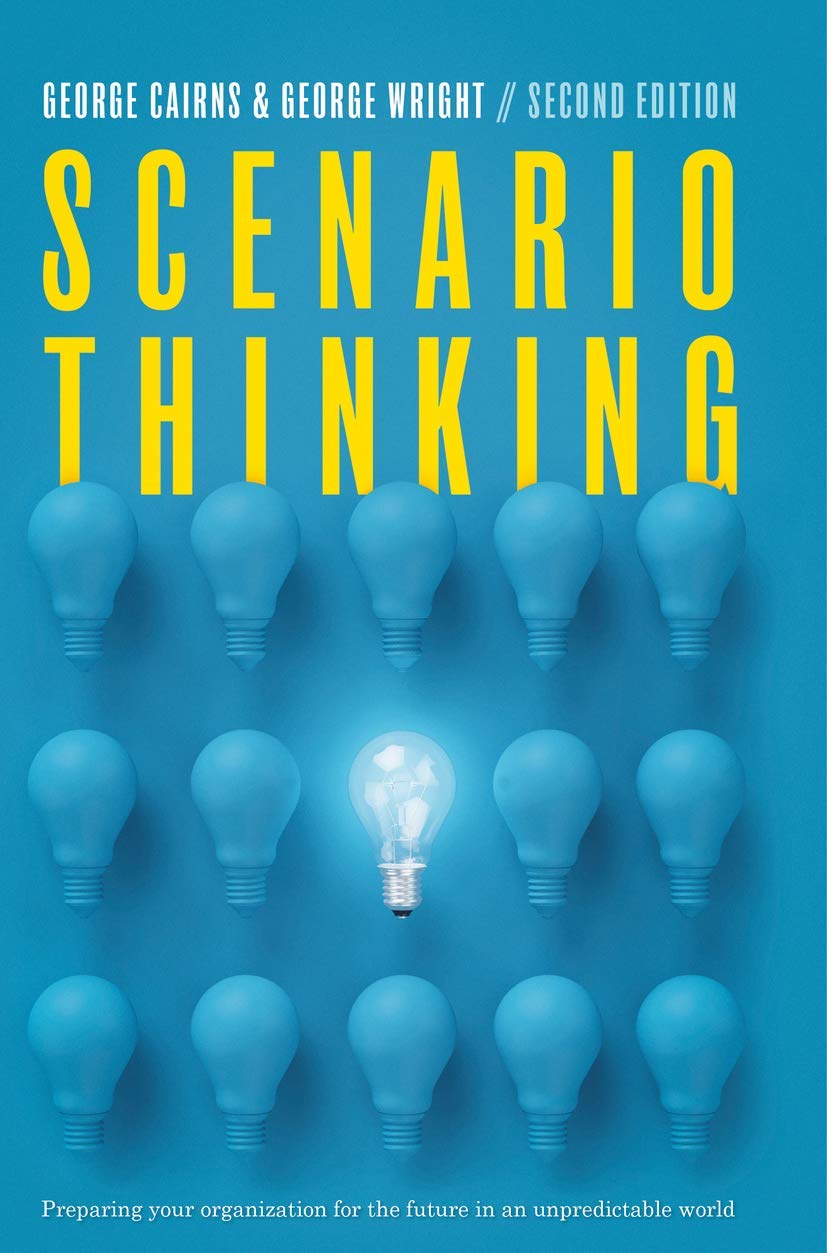Scenario Thinking by George Cairns and George Wright
A few weekends ago I attended the Guardian Weekend MBA: a series of talks and seminars for people running their own businesses or in management. The most interesting (for me) was a session run by George Wright from University of Strathclyde Business School who introduced us to the concept of Scenario Thinking.
It’s a way of thinking about the future which takes into account how hard it is to a) see things coming and b) look outwards and recognise how much impact comes from the outside. (We tend to be more preoccupied with what’s going on inside our business, or inside our world…)
I was struck by the argument that a lot of innovation simply comes from outsiders breaking into your world: think about all those dairy-free ‘dairy’ products we are consuming these days! Or how Apple is one of the biggest sellers in the prestige watch market. Airbnb has shaken up how we do ‘staying away’…
(Obviously when you are in the middle of a pandemic thinking about the importance of ‘outside factors’ on your business is up-front and central… we all need this!)
So looking outside when thinking about what could happen to your business makes sense.
And thinking about how you would ‘win’ in those circumstances makes sense too.
How do you do scenario thinking?
Well, I’m still working my way through the book. But the core process goes like this…
- agree your focal issue of concern (for example, how do we sell more bread…) and a time frame (in the next five years)
- identify driving forces: all the things that could affect the focal issue of concern: reference PESTEL (political, economic, social, technological, ecological, legal) influences – keep it concrete. Don’t say for example… inflation could happen, that’s too broad/ theoretical/ and deflation could happen too… so be more concrete – price fluctuation in supply-side costs. Use post-its. One per force. Number them. Keep going so you have as many as you can (in the time you’ve got)
- cluster the driving forces into groups of related ideas: identify a unifying theme/ higher order ‘factor’ at play and name the higher order factor
- for each cluster identify what an extreme outcome could be (got to be possible/ plausible)… go low, go high… put this thinking to one side for now
- next, plot the higher order factors you’ve got onto a flipchart: plot on the x axis from low impact on my business, to high impact on my business; then plot on the y axis based on low to high certainty of this happening
- return to your ‘extreme outcomes’ thinking and start to frame different scenarios for the most important factors (high likely/ high impact) and all others you are interested in… explore what it would take for this to happen, how the different factors impinge on each other – if this factor happens, then what about this factor…
- develop story-telling around ‘how we got here’ – what kind of world would be inwith this kind of future, and include knowable future events as part of the story timeline (for example Brexit happening, or other new laws being enacted – like GDPR)
From this you can then start to strategise – what do we need to do to achieve our goal/ solve our problem/ win based on this kind of a future…
Even if your future scenario doesn’t play out as envisaged (and how could it, the future is unknowable), just thinking about alternatives and how you would flex is a useful mental tool. And of course pin-pointing what is likely (probable or plausible is what Cairns and Wright get us to think about it)… that could open a business’ eyes a lot wider.
Why are we interested in this at Qual Street?
Three reasons:
- The process is qualitative – guiding a team to through this kind of thinking is a qualitative process
- We love innovation, and see this as an innovation tool
- We can see our clients could benefit from this
This has got to be one of those ‘learning by doing’ techniques… so if anyone out there wants to experiment with us in Scenario Thinking we’d love to pilot it with you…
Meanwhile, I’ll carry on reading the book!



